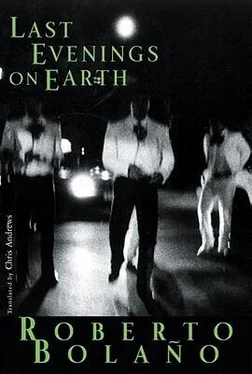When he returns to the museum cafй M is still sitting there with her legs crossed, underlining something in the newspaper with a silver ballpoint pen, probably an ad for a job. As soon as B appears she discreetly folds the paper away. They eat at a restaurant in the rue des Bйguines. M hardly touches her food. She hardly talks either, and when she does, it is to suggest they visit the cemetery together. I often come down this way, she says. B looks at her and makes it clear that he has no desire at all to visit a cemetery. On the way out of the restaurant, however, he asks where the cemetery is. M does not reply. They get into the car and less than three minutes later her hand (a slender and elegant hand, thinks B) is pointing out the Du Karreveld Castle, the Demolen-beek Cemetery, and a sports complex with tennis courts. B laughs. Ms face, by contrast, remains hieratic and impassive. But underneath, thinks B, she is laughing too.
What are you going to do tonight? she asks as she drops him off at his hotel. I don't know, says B, read maybe. For a moment B thinks that M has something to say to him, but she says nothing. That night B does in fact lie down and try to read one of the novels he didn't leave behind in Paris, but after a few pages he gives up and tosses it to the floor. He leaves the hotel. After walking aimlessly for a long time he comes to a part of the city in which there are many colored people. That is what he thinks, that is how he articulates his thought as he sees himself walking through those streets. He has never liked the expression "colored people." So why did that phrase cross his mind? Black people, Asians, North Africans, yes, but not colored people, he thinks. Soon after, he goes into a topless bar. He orders chamomile tea. The waitress looks at him and laughs. She is pretty, about thirty years old, tall and blonde. B laughs too. I'm not well, he says, still laughing. The waitress makes his chamomile tea. That night B sleeps with a black girl who talks in her sleep. Her voice, which B remembers as soft and musical, has become hoarse and querulous, as if at some point during the night, unbeknownst to B, her vocal cords had undergone a transformation. It is, in fact, her voice that wakes him, with the effect of a hammer blow, and then, once he is over the shock, he lies there propped up on one elbow listening for a while, until he decides to wake her up. What were you dreaming about? he asks her. The girl replies that she was dreaming about her mother, who died not long ago. The dead are at peace, thinks B stretching out in the bed. As if she had read his mind, the girl says that no one who has passed through this world is at peace. Not anymore, not ever, she says with total conviction. B feels like crying, but instead he falls asleep. When he wakes up the following morning, he is alone. He does not have breakfast. He stays in his room reading until the cleaning lady asks if she can make the bed. While he is waiting in the lobby, M telephones for him. She asks him what he is planning to do. Before he knows it, M has arranged to come and pick him up.
That day, they visit another museum, as B suspected they might, and then they eat at a restaurant next to a park where packs of children and adolescents are skating. How long are you going to stay here? asks M. B says he is thinking of leaving the next day. And going to Masnuy Saint-Jean, he adds, anticipating M's question. M has no idea what part of Belgium the village is in. Nor do I, says B. If it isn't too far I could drive you, says M. Do you have friends there? B replies in the negative. When they finally go their separate ways outside the hotel, B walks around the district until he finds a pharmacy. He buys condoms. Then he heads toward the topless bar where he went the night before, but although he searches street after street (and gets lost several times in the process) he cannot find it. The next day he has breakfast with M in a roadside restaurant. M tells him that sometimes when she is sad she gets into her car and drives, without having a clear idea where she is headed, just for the pleasure of being on the move. Once, she says, I got to Bremen and I didn't know where I was. All I knew was that I was in Germany, that I had left Brussels that morning and now it was night. And what did you do? asks B, who can guess the answer. I turned around and came back, says M.
In Masnuy Saint-Jean they see cows. Trees. Fallow fields. A prefab shed. Three-story houses. At B's request, M asks an old woman who is selling vegetables and postcards how to get to Julia Nys's house. The old woman shrugs her shoulders, but then starts laughing and launches into a long speech, which B can hear from the car. M and the old woman are both gesturing, as if they were talking about the rain or the weather, thinks B. The house is in the rue Colombier; it has a sizeable, neglected garden and a shed that has been turned into a garage. The walls of the house are yellow and the windowless left half is shaded by a large tree that has not been pruned for a long time. She was crazy, that old bat, says M, it could be this house or any other house in the village. B rings the doorbell, which sounds like a real bell with a clapper. After a while a girl appears, wearing jeans, with wet hair; she's about fifteen. M asks her if this is the house where Julia Nys and her son Henri used to live. The girl says Monsieur and Madame Marteau live here. Since when? asks B. Since always, says the girl. Were you washing your hair? asks M. I was dyeing it, says the girl. A short conversation follows, which B does not understand, and yet, for a moment, M in her high heels on one side of the fence and the girl in her tight jeans on the other seem to be the principal figures in a painting, which initially gives an impression of peace and balance, but then strikes him as deeply disturbing. Later, after exploring the village from north to south and south to north, they go into what seems to be the library. Is this where Henri of Masnuy came to read? It can't be. The library is new and Lefebvre must have frequented the old one, the one that was here before the war. There must have been at least two libraries between Henri's and this one, says M, who is better acquainted with her country's public institutions. For lunch, B has a steak and M a salad, half of which she leaves. I wasn't even born when your friend died, says M nostalgically. He wasn't my friend, says B. But you were alive, says M, with a gently mocking smile. I was traveling when he died, says B.
Later, when all the other customers have left the restaurant, and they are alone at their table by the window, M reads Luna Park 2 and stops at the last page, which announces forthcoming contributions for Luna Park 3 or Luna Park 4, if the fourth number ever saw the light of day. She reads out the list of future contributors: Jean-Jacques Abrahams, Pierrette Berthoud, Sylvano Bussoti, William Burroughs, John Cage, and so on up to Julia Nys, Henri Lefebvre, and Sophie Podolski. An all-star cast, says M with a mocking smile.
They're all dead, thinks B.
And then: What a pity M doesn't smile more often.
You have a beautiful smile, he says. She looks him in the eye. Are you trying to seduce me? No, no, God forbid, murmurs B.
Late in the afternoon they leave the restaurant and go back to the car. Where to? asks M. Brussels, says B. M sits there pensively for a while, then says she doesn't think it's a good idea. All the same, she switches on the ignition. There's nothing more for me to do here, says B. This sentence will pursue him throughout the return journey like the headlights of a phantom car.
When they arrive in Brussels B wants to go back to his hotel. M thinks it's ridiculous to waste money on a couple of hours in a hotel when she has a sofa bed he can use. They sit talking in the car outside M's apartment for a while. Finally B accepts her offer to put him up for the night. He is planning to leave very early the next day to catch the first train to Paris. They have dinner at a vegetarian restaurant run by a couple of Brazilians, which is open till three in the morning. Once again they are the last customers to leave the premises.
Читать дальше












